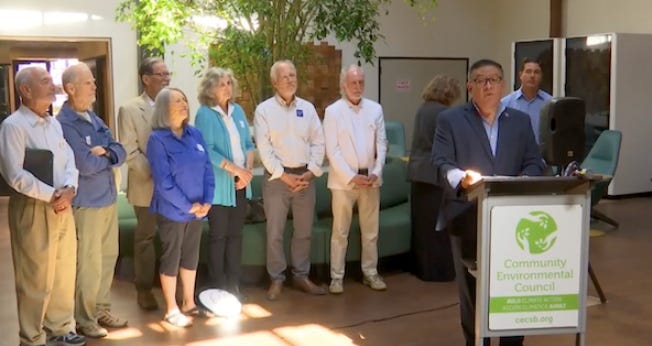The world, at last, is waking up to the existential threat of climate change
NEWSLETTER, Sept. 2023—Citizens' Climate International trains climate advocates at African Climate Summit; Climate-smart trade is on the table; Carbon-fee-and-dividend bill introduced in Congress.
As a summer filled with climate-related disasters gives way to autumn in the northern hemisphere, it seems the world has finally gotten the memo from Mother Nature: Stop burning things that heat up the planet or face cataclysmic consequences. An increasing awareness of the threats posed by climate change is putting pressure on governments and institutions to ratchet up the response to those threats. In conjunction with the United Nations General Assembly last month, UN Secretary-General Antonio Guterres hosted the Climate Ambition Summit to showcase the actions, policies and plans that are accelerating the decarbonization of the global economy. In highlighting the positive steps being taken to rein in climate change, Guterres sets the stage for more nations to improve their climate efforts and bring more ambitious commitments to COP28 in November. As always, the extent of that ambition will be determined by the political will generated by citizens who hold their governments accountable.
CCI trains climate advocates at Africa Climate Summit
Last month, Kenya hosted the first Africa Climate Summit. As heads of state gathered to discuss mobilizing finance to deal with the impact of climate change, Citizens' Climate International was mobilizing citizens to engage their governments to enact climate solutions. CCI Africa Coordinator David Michael Terungwa (above) led a workshop in Nairobi where he taught 44 people from eight countries about carbon fee and dividend and how to lobby members of parliament to enact the carbon pricing policy. Thirty-one of the trainees were from Kenya, and a week later they lobbied the Kenyan Parliament.
One major outcome of the Africa Climate Summit was a declaration that included a call for a global carbon taxation regime. In a press release, CCI's Terungwa said, “In addition to being the most effective tool for reducing greenhouse gas emissions, a global system for coordinated carbon taxation can also provide the much-needed resources for African countries to transition away from fossil fuels and adapt to the damaging effects of climate change.”
Climate-smart trade must be part of the solutions portfolio
In order to prevent significant parts of the world from becoming uninhabitable, we must take a wholistic approach to solving climate change, recognizing that the climate must be considered in all aspects of society — food, finance, health, etc. One area of critical importance on that list is trade. As CCI Executive Director Joe Robertson said in a briefing note, “Trade shapes the fiscal, economic, technological, and political lives of nations; it determines whether we have the means to avoid conflict.” Joe goes on to say that “climate-smart means safe, resilient, thriving, and less likely to generate massive, sudden, unavoidable costs. Climate-smart means not only the powerful, but also the vulnerable, are less likely to be knocked out of the everyday economy.”
To make trade more climate smart, we must eschew the extractive model of enterprise —taking value out, without restoring or sustaining it. Being climate smart also means measuring the non-financial returns of trade and relying less on the blunt instrument of gross domestic product for measuring well-being, a yardstick that rewards depletion of irreplaceable resources. Find out more about climate-smart trade in CCI’s briefing note.
Carbon fee and dividend bill introduced in U.S. Congress
At Citizens’ Climate International, we maintain that the best tool for reducing greenhouse gas emissions is an effective price on carbon. In order for that price to be high enough to have a significant impact on emissions, the policy must have public support. Giving proceeds from the carbon fee to the people, thereby alleviating economic hardship from the fee, is the best way to gain that support.
This kind of carbon-fee-and-dividend legislation was introduced in the U.S. House of Representatives last week by Rep. Salud Carbajal (D-CA). In endorsing the bill, Citizens’ Climate International Executive Director Joe Robertson said, “At CCI, we consider this the gold standard for carbon pricing and the best way to quickly phase out fossil fuels. This legislation can be a model for other countries to price carbon. By giving the proceeds to households, polluters will bear the cost for their harmful activities, not people.”
Carbon pricing policies that return proceeds to households have been enacted or are under consideration in Canada, Austria, Switzerland and Germany.
In addition to speeding up the transition to clean energy, the bill would also protect American businesses from unfair competition with imports from countries that do not have an equivalent price on carbon, applying what is known as a carbon border adjustment mechanism (CBAM).
Signs of hope at Climate Week and UN General Assembly
Last month, tens of thousands of climate activists, along with heads of state from nations from around the world, gathered in New York City for Climate Week and the United Nations General Assembly. CCI Executive Director Joe Robertson was there and saw reasons to be hopeful that the world is “working toward a paradigm shift, in which benefits to people and planet are core value considerations for investors and nation-states.” Some takeaways:
Political and corporate leaders are increasingly asking each other to do better, get more engaged, and get to work on shaping a more sustainable future. Real courage for leading a transformation, however, is still hard to find.
Innovation needs to be specific, contextual, and suited to improving lives and livelihoods; this also means small and medium-sized enterprises will need to provide new goods and services in context, to fill out sustainable value chains.
Food security is beginning to be seen as not only relevant, but as a connective tissue, a fabric of everyday interactions that comprise food systems and economies, and which makes it hard to avoid investing national resources toward the Sustainable Development Goals.
Trade is on the table. It is no longer taboo to talk about aligning trade relations, and related national and international regulations, with climate goals and shared sustainable development. With bold cooperative action, we can achieve climate-smart trade.
For the first time, we have heard private-sector leaders express interest in the Capital to Communities approach—giving stakeholders a voice to make financial innovation more relevant and more likely to succeed.
Citizens’ Climate volunteers lobby for cleaner electricity in Ontario
Late last month, Citizens’ Climate volunteers in Ontario teamed up with several organizations to call on the government to accelerate the reduction of greenhouse gases and pause the expansion of methane-fired electricity in the province. At an event that brought together 30 advocates, citizens met with seven members of the provincial parliament and four of their staffers. One of the advocates, 10-year-old Robert from Children's Climate Championship (below), gathered signatures on his "Trick or Treat" pledge and posted a short video about his experience and hopes. MPPs Jamie West and Mike Schreiner read petitions from CCL Canada into the official government record.
Cathy Orlando, Director of Programs at Citizens' Climate International, summed up the urgency of the situation, emphasizing the need to avoid undoing the progress made by phasing out coal in Ontario. She highlighted the potential harm of expanding methane-fired electricity in the province and the tragic waste of hundreds of millions of dollars each year.
Coming up
Earth Diplomacy Leadership workshops: The series, presented by CCI and the Fletcher School at Tufts University, begins Oct. 3 leading up to COP28 in November. Details and registration here.
Media training for CCI Europe: CCI Senior Communications Advisor Steve Valk will lead an online workshop at 8 p.m. (Central Europe) on Oct. 3 on how to get letters to the editor published. Check your inbox for an invitation from CCI Europe.
CCL Canada's National Conference and Lobbying Days will take place Oct. 15-17. Look for an email from CCL Canada after Labour Day. Details and registration here.
CCI Group Leader Global Check-In Calls resume the second Tuesday of the month. Leaders please check your emails.
CCI Get-To-Know-Us Calls return the third Wednesday of the month. Go here for registration details.










